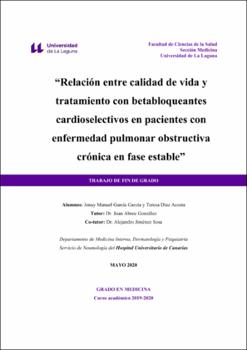Relación entre calidad de vida y tratamiento con betabloqueantes cardioselectivos en pacientes con enfermedad pulmonar obstructiva crónica en fase estable
Fecha
2020Resumen
La enfermedad pulmonar obstructiva crónica (EPOC) es una alteración del flujo respiratorio
que no es totalmente reversible asociada a una respuesta inflamatoria elevada y continua en el
tiempo, siendo el responsable principal el humo del tabaco. Actualmente, el centro
terapéutico de esta enfermedad son los fármacos broncodilatadores combinados con fármacos
antiinflamatorios. Sin embargo, estos pacientes tienen una gran comorbilidad a nivel
cardiovascular y en su tratamiento se añaden los betabloqueantes, siendo de elección dentro
de estos, los cardioselectivos, porque no tienen efecto broncoconstrictor sobre la vía aérea.
Este es un estudio observacional, de cohortes, retrospectivo, que pretende determinar cómo
influyen estos fármacos sobre la calidad de vida, número y gravedad de las exacerbaciones de
1
estos pacientes. Se incluyeron a pacientes con fase estable de la enfermedad, en tratamiento
domiciliario con fármacos broncodilatadores, en estadios II, III y IV de la GOLD (Global
Initiative for Obstructive Lung Disease) y sin deterioro cognitivo. Se les clasificó en función
de la toma de betabloqueantes cardioselectivos y se evaluó el número de exacerbaciones, así
como la calidad de vida con los test London Chest Activity of Daily Living Scale (LCADL) y
COPD Assesment Test (CAT) en cada grupo. Finalmente, se observó que los que consumían
betabloqueantes cardioselectivos tenían un número de exacerbaciones graves superior. No
hubo significación estadística en el ámbito de la asociación entre calidad de vida o
exacerbaciones moderadas y estos fármacos. Chronic obstructive pulmonary disease (COPD) is a respiratory flow disorder not fully
reversible. It is associated with a high and continuous inflamatory response over time, mainly
due to tobacco smoke. Currently, the treatment for this disease is the combination of
bronchodilators and anti-inflamatory drugs. However, because of the strong association with
cardiovascular co-morbidities that these patients exhibit, cardioselective betablockers are
added to the treatment, because they have no bronchoconstrictive response. This is
an observational, retrospective and cohort study designed to determine how these drugs
impact upon quality of life, number and severity of exacerbations of patients with COPD. We
included patients with stable disease (stages II, III and IV of the GOLD scale) and without
cognitive imparitment, that were undergoing treatment with bronchodilators. Patients were
classified according to the cardioselective betablockers intake, and we assessed the number of
exacerbations, as well as life quality using London Chest Activity of Daily Living Scale
(LCADL) and COPD Assesment Test (CAT) on each group. Finally, we noticed that patients
taking cardioselective betablockers had more severe exacerbations. There was no statistical
association among quality of life, moderate exacerbations and these drugs.





